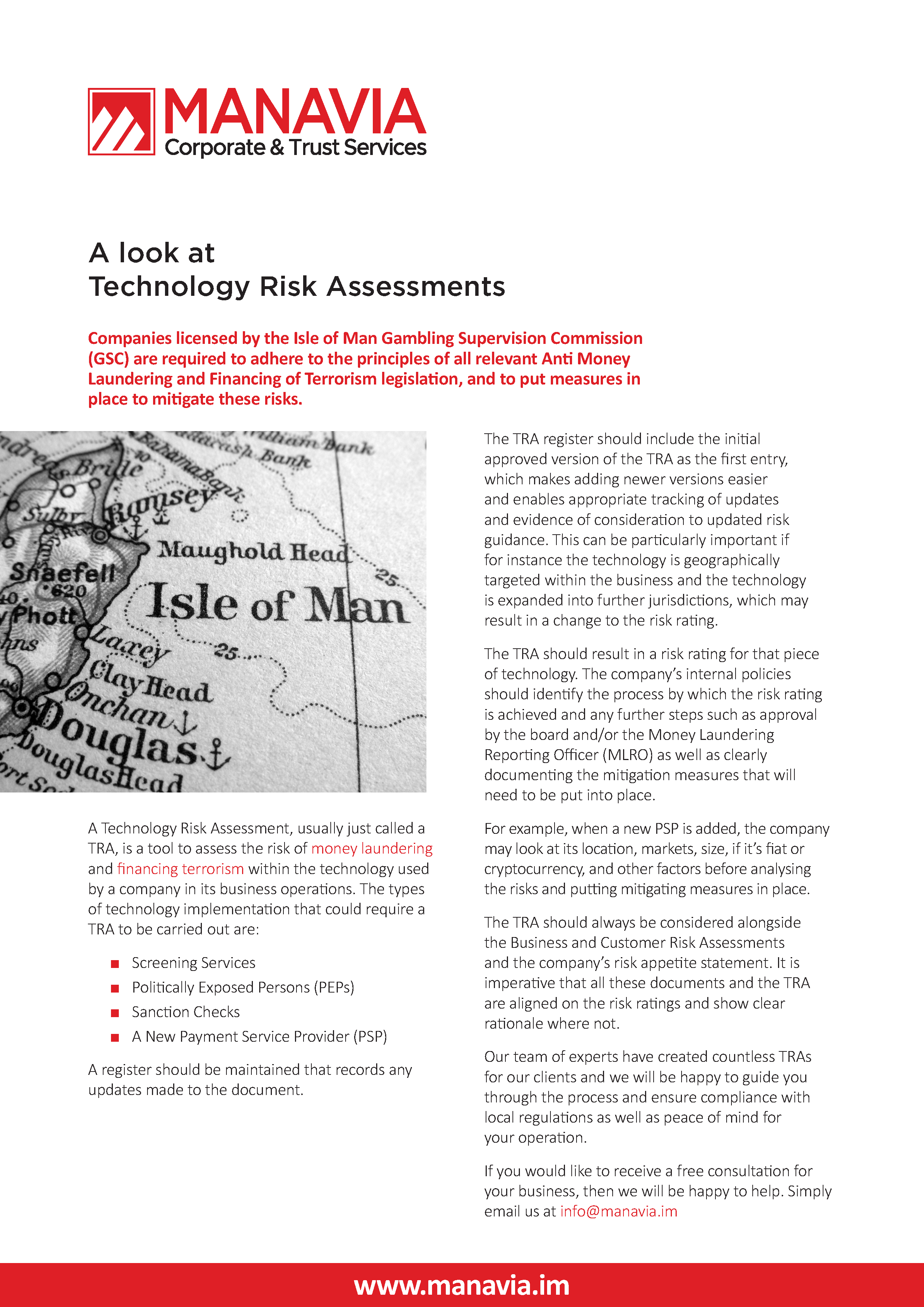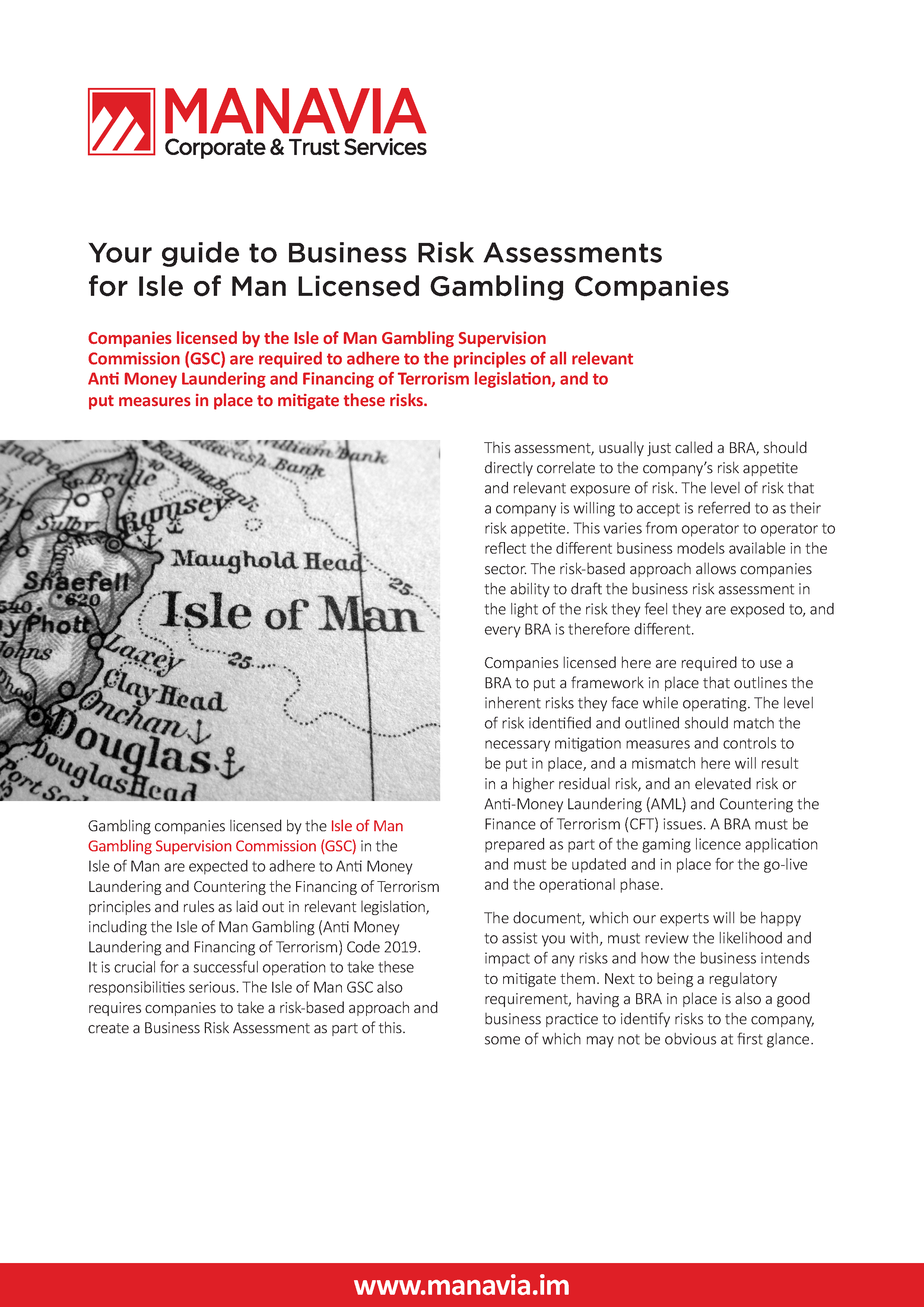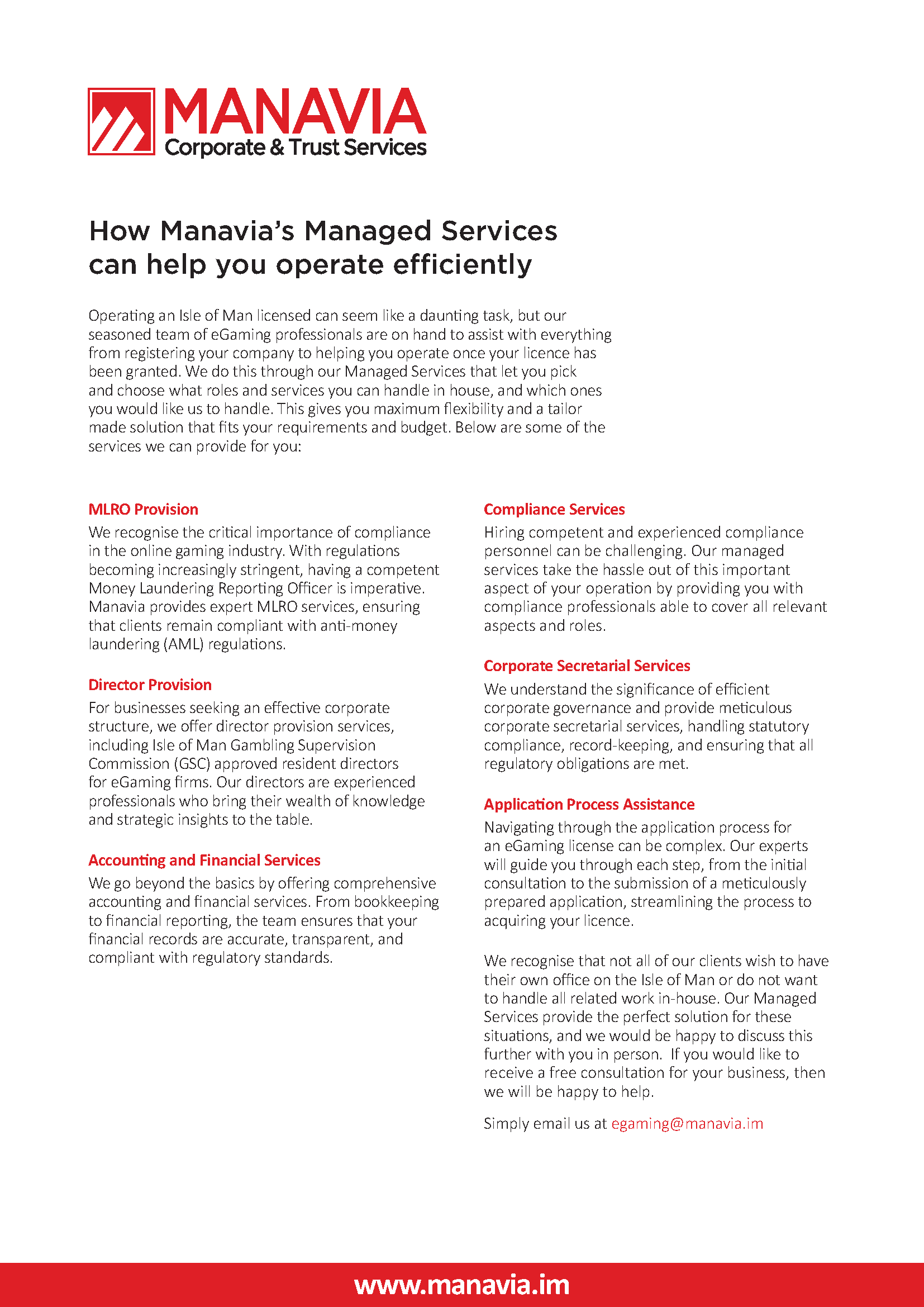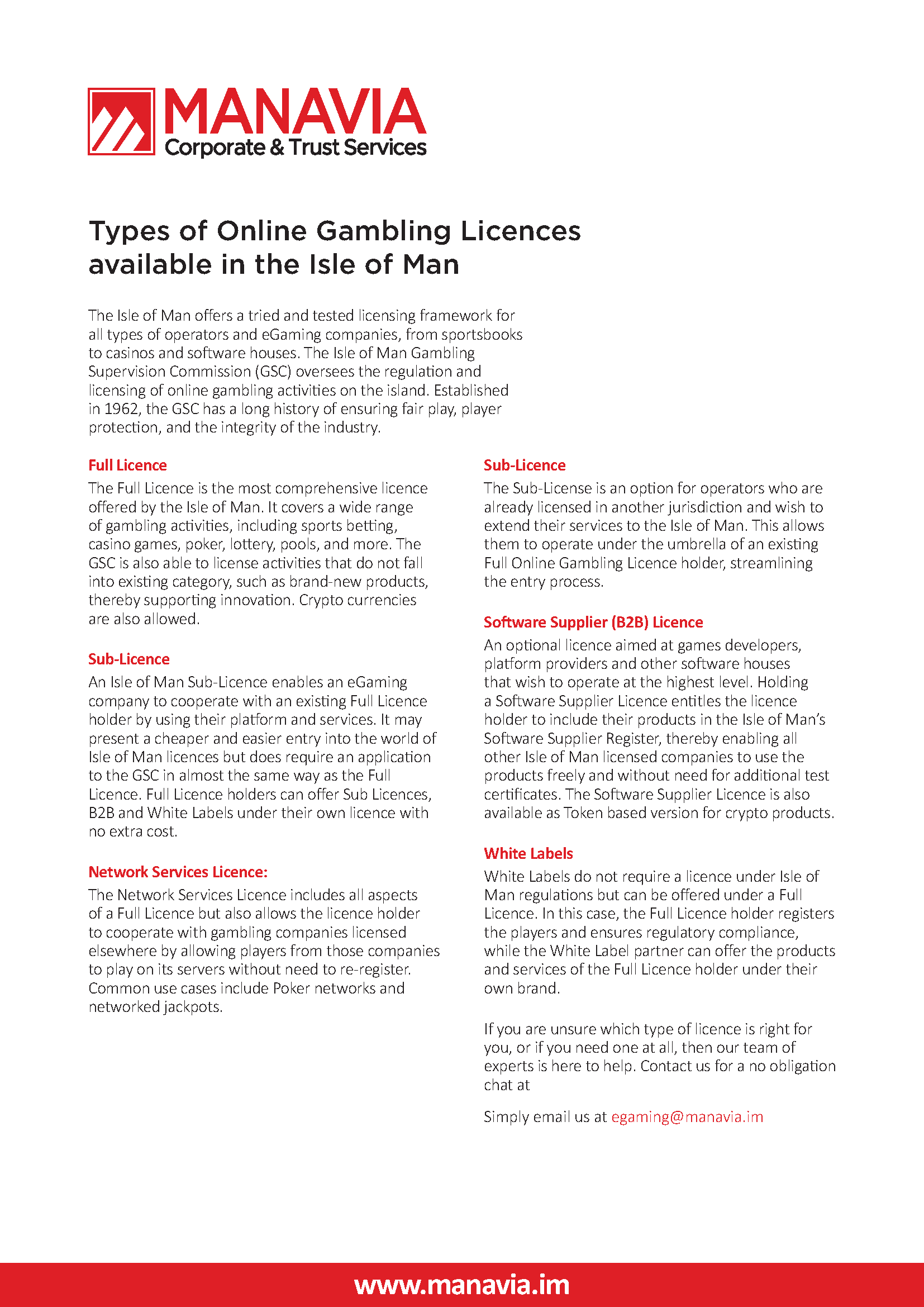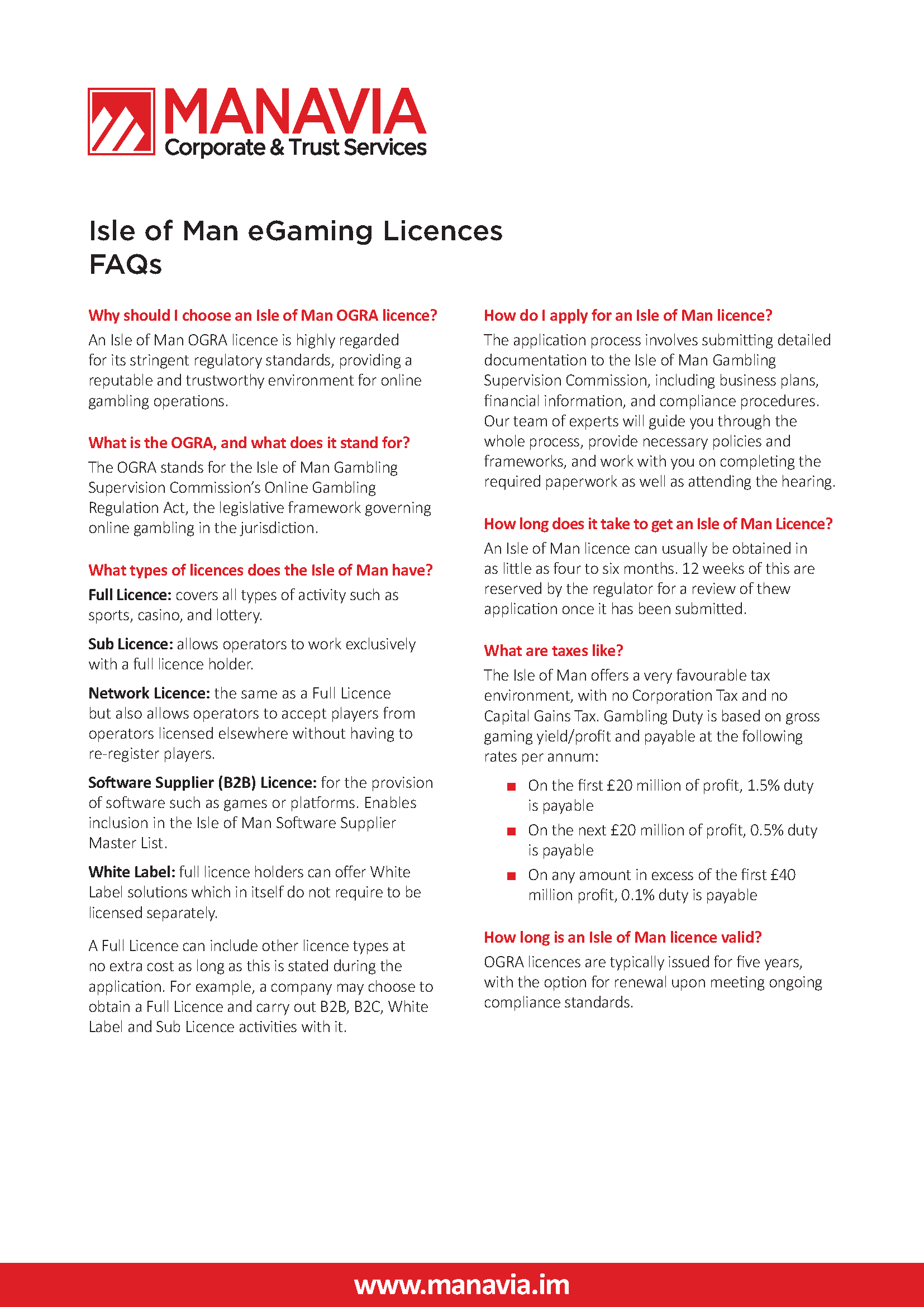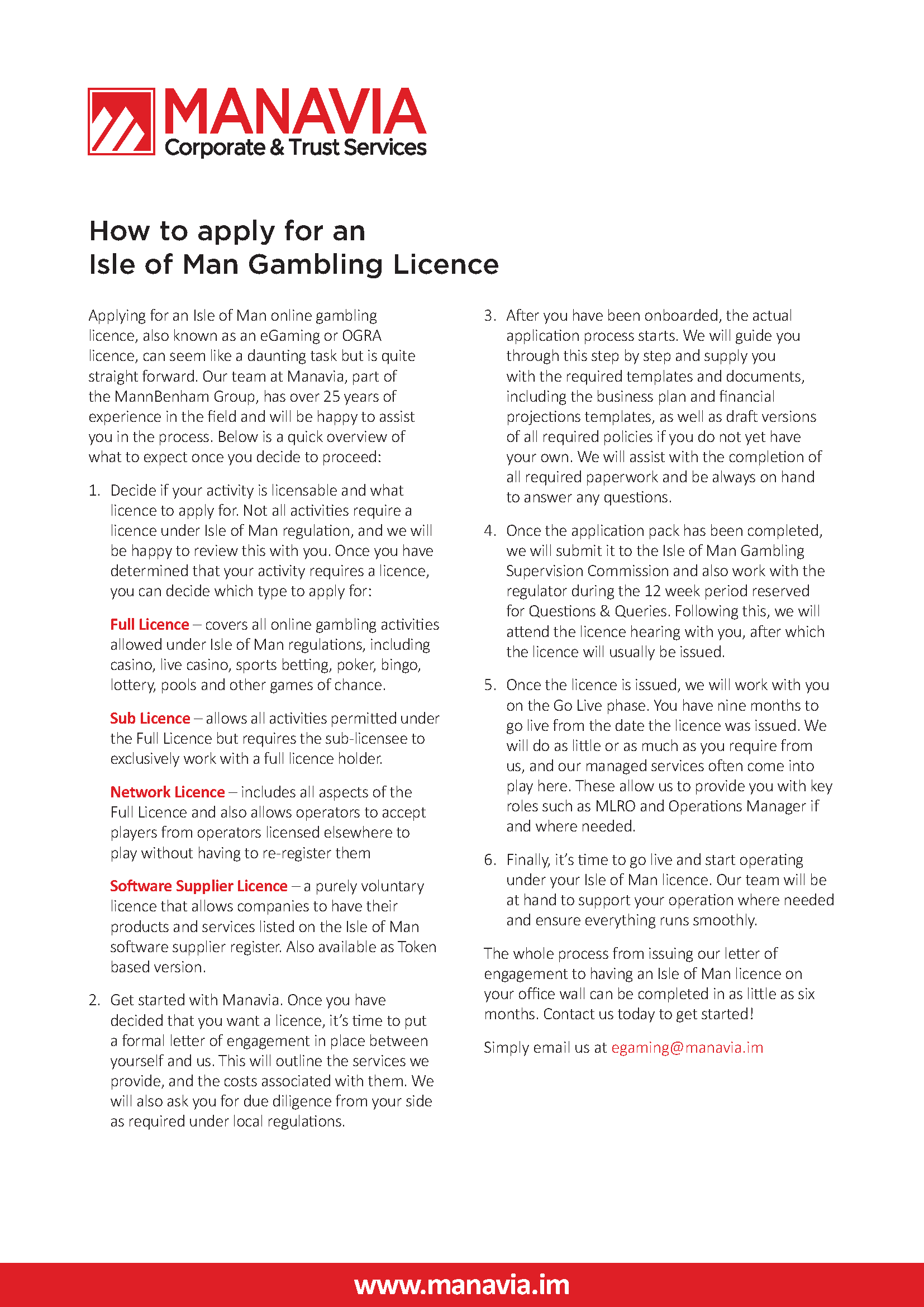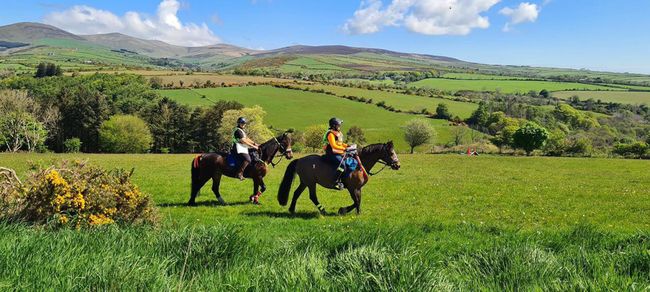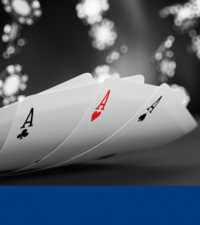1 Relevant Authorities and Legislation
1.1 Which entities regulate what type of gambling activity in your jurisdiction?
The Isle of Man regulator of all gambling activity is the Gambling Supervision Commission (“GSC”), which is an independent statutory board established in 1962. The GSC comprises the Inspectorate and the Commission. The Inspectorate is managed by its Chief Executive. The Commission comprises five independent members of the public, who are appointed by the Isle of Man Treasury. Typically, the Commission sit once.
1.2 Specify all legislation which impacts upon any gambling activity (including skill and social games), and specify in broad terms whether it permits or prohibits gambling.
The Isle of Man gambling legislation is split between land-based activities, such as casinos, bookmaking and lotteries, and gambling that takes place “online”.
- The Gaming Betting and Lotteries Act 1988 (“GBLA”)
The GBLA relates to gaming, betting and lotteries and identifies the following forms of gambling:- gaming;
- amusements with prizes;
- betting;
- pool-betting;
- totalisors; and
- lottery.
- The GBLA also gives power to the GSC to make regulations under the GBLA. The current regulations under this Act are:
- Bingo Nights (Prescribed Conditions) Regulations 2010, which prescribe the conditions to be complied with where bingo is played as part of a fund-raising event.
- Racing Nights (Prescribed Conditions) Regulations 2010, which prescribe the conditions to be complied with by a lottery forming part of a fund-raising event.
- Gaming, Betting and Lotteries (Society Lottery Advertisements) Regulations 2011, which provide how a registered charity (as defined) may advertise its fundraising lotteries.
- Pool betting
This is covered by the Pool Betting (Isle of Man) Act 1961, the Pool Betting (Isle of Man) Act 1965 and the Pool Betting (Isle of Man) Act 1970. - Gaming at Casinos
The Casino Act 1986, the Casino (Amendment) Act 1990 and the Casino (Amendment) Act 2012 relate to gaming at casinos.</br/>The Casino Act 1986 t section 11(2) provides that the GSC shall make regulations to prescribe the games that may be played in gaming rooms and to prohibit the playing of games not so prescribed.
The following games are currently prescribed and may be played in gaming rooms of a casino:- Roulette.
- Blackjack.
- Pontoon.
- Punto banco.
- Bingo.
- Gambling on horse races shown on film or video.
- Casino brag.
- Poker.
- Games of dice.
- Baccarat.
- Chemin de fer.
- Backgammon.
- Keno.
- Playing on automatic machines.
- Wheel of fortune.
- Super Pan 9.
- The following regulations are currently in force under the Casino Act 1986:
- Casino (Licence Applications) Regulations 1986, which set out to whom an application for a casino licence should be made and matters which should be included in such a licence application;
- Casino Regulations 2011, which, in addition to prescribing the games that may be played in the gaming rooms of a casino, also include provision relating to the administration, operation, financial provision, and enforcement and licensing of casinos; and
- Casino (Temporary Premises) Regulations 2013, which describe the procedures and requirements in respect of temporary certificated premises.
- Amusements or “controlled” machines
The keeping for use and the sale and supply of amusement or “controlled” machines is covered by the Gaming (Amendment) Act 1984 and the regulations made thereunder. - National Lottery Act 1999
The National Lottery Act 1999 extends the UK National Lottery to the Isle of Man. - Online Gambling
The regulation of online gambling is primarily covered by the Online Gambling Regulation Act 2001 (“OGRA”).
With the exceptions of spread betting, all forms of online gambling are potentially licensable.
The following forms of gambling when conducted online require an OGRA licence:- Sports book.
- Betting exchanges.
- Online casino games (e.g. roulette, blackjack).
- Live dealing.
- Peer-to-peer (e.g. poker, bingo).
- Mobile phone betting.
- Fantasy football.
- Financial trading (but not spread betting).
- Pari-mutuel and pool betting.
- Network gaming.
- Lotteries.
- Certain spot-the-ball style games.
- Network services.
- OGRA also makes provision for regulations to be made under the Act by the Treasury in relation to various matters, for example in respect of:
the principles and rules in accordance with which online gambling of any description shall be conducted;-
- Sports book.
- Betting exchanges.
- Online casino games (e.g. roulette, blackjack).
- Live dealing.
- Peer-to-peer (e.g. poker, bingo).
- Mobile phone betting.
- Fantasy football.
- Financial trading (but not spread betting).
- Pari-mutuel and pool betting.
- Network gaming.
- Lotteries.
- Certain spot-the-ball style games.
- Network services.
OGRA also makes provision for regulations to be made under the Act by the Treasury in relation to various matters, for example in respect of:
-
- the principles and rules in accordance with which online gambling of any description shall be conducted;
- the advertising of online gambling; and
- verifying the identity and age of participants.
Currently, the following regulations are in force under OGRA: - Online Gambling Duty Regulations 2008.
- Online Gambling (Advertising) Regulations 2007.
- Online Gambling (Prescribed Descriptions) Regulations 2007.
- Online Gambling (Systems Verification) (No.2) Regulations 2007.
- Online Gambling (Betting and Miscellaneous Provisions) Regulations 2007.
- Online Gambling (Disaster Recovery) (No.2) Regulations 2007.
- Online Gambling (Registration and Accounts) Regulations 2008.
- Online Gambling (Registration and Accounts) (Amendment) Regulations 2014.
- Online Gambling (Licence Fees) Regulations 2009.
- Online Gambling (Exclusions) Regulations 2010.
- Online Gambling (Exclusions) (Amendment) Regulations 2014.
- Online Gambling (Participants’ Money) Regulations 2010.
- Online Gambling (Participants’ Money) (Amendment) Regulations 2014.
- Online Gambling (Amendment) (Network Services) Regulations 2014.
Social games and skill games are not currently specifically regulated by statute.
Application for a Licence and Licence Restrictions
2.1 Who can apply for a licence to supply gambling facilities?
Where the licensable activity is in respect of land-based gambling, any person or Isle of Man company may apply for a licence. For online gambling under the OGRA the applicant must be an Isle of Man company.
2.2 Who or what entity must apply for a licence and which entities or persons, apart from an operator, need to hold a licence? Are personal and premises licences needed? Do key suppliers need authorisation?
Any person or entity which falls within the ambit of the gambling licensing regime must apply for a licence. Examples of licensable activities are set out at question 1.2 above.
In relation to OGRA, given that this is the biggest growth area in recent years, any person who “conducts” “online gambling”, and does not fall within any of the exemptions under OGRA, must hold an OGRA licence.
For the purposes of OGRA, “online gambling” means — (a) any gaming, where any player enters or may enter the game, or takes or may take any step in the game, by means of a telecommunication, (b) the negotiating or receiving of any bet by means of a telecommunication, or (c) any lottery in which any participant acquires or may acquire a chance by means of a telecommunication. OGRA provides that: “For the purposes of this Act, a person “conducts” online gambling where — (a) in the case of gaming or a lottery, he takes part in its organisation, management or promotion;
(b) in the case of a bet, he carries on any business involving the negotiating or receiving of the bet; or (c) he maintains, or permits to be maintained, in the Island any computer or other device on or by means of which the game or lottery is operated, or the bet is received, as the case may be.”
In relation to land-based activities:
- Where any person wishes to carry on business or act as a bookmaker, or hold himself out or represent himself to be a bookmaker, such a person must hold a bookmakers permit authorising him to do so. It is also necessary, pursuant to section 15 of GBLA, for a licensed bookmaker to hold a betting office licence for any premises at which he carries on, or represents himself as carrying on, the business of a bookmaker.
- Any person who keeps for use, or who sells or supplies “controlled” machines is required to hold a certified/licence, unless they fall within the specific exemptions within GBLA.
- The offering of games at a casino requires a licence as set out at question 1.2 above.
What restrictions are placed upon any licensee?
A licensee is restricted to the terms of its licence and the applicable legislation. The GSC has the ability to apply any condition to a licence that it considers fit, and by way of example such restrictions would ordinarily include:
- the licence is not assignable;
- the licensee must not allow a person (or persons acting in concert) to assume or increase ownership of the licensed company, directly or via other holdings or arrangements, unless the ownership of the licensed company is wholly public; or the ownership of that person (or those persons acting in concert) afterwards is less than 5 per cent of the licensed company; or the ownership has been approved by the Commission or the inspectorate;
- the licensee must not operate, or be associated or linked with, online gambling sites not regulated by OGRA except with the consent of the Commission. If the Commission approves the association or link, any reference or linked access to the associated gambling sites must be made through a web page that indicates that the player is leaving the jurisdictional control of the Isle of Man; and
- the licensee must operate through a trading account(s) in a bank located in the Isle of Man, unless agreed otherwise with the Treasury. In addition, any bank accounts for trading or gambling purposes should be located in the Isle of Man, unless agreed otherwise with the Treasury.
In relation to casinos, the Casino Act 1986 provides that a casino licence shall contain the following conditions:
- that the holder of the licence, if a body corporate, shall notify the GSC of any change in the beneficial ownership of any relevant share capital in the body;
- where the holder of the licence is a body corporate, that no person shall be appointed to be a director of the body unless the GSC is satisfied that he is a person of integrity;
- that no structural alteration or extension of the casino shall be carried out without the consent of the GSC;
- that no part of the casino other than a room specified in the licence shall be used as a gaming room or, as the case may be, for the sale or supply of intoxicating liquor;
- that the whole of the casino and any associated premises shall remain in the occupation and under the control of the holder of the licence; and
- that the holder of the licence shall continue to provide at the casino, and any associated premises, the facilities and amenities specified.
2.4 What is the process of applying for a gambling licence?
Online Gambling Licence
The OGRA application process is designed to elicit from the applicant as much information as possible to enable the GSC to carry out detailed enquires and reach an informed decision as to the suitability of the applicant for a licence.
In order to apply for an OGRA licence, an application form and ancillary documentation, together with the required fee, must be submitted to the GSC. A personal declaration form for each of the following also needs to be filed with the application:
- All shareholders of the applicant company with holdings above 5%, and any other shareholder of the ultimate parent company and any companies in between holding above 5%.
- All directors for the applicant company if it is a privately owned entity.
- The designated officials.
- The operations manager (if any).
References for the above persons must also be included, together with a business plan for the applicant company which should include chapters covering the following:
- Financial accounts.
- Ownership.
- Terms and conditions.
- Games rules.
- Internal control systems.
- Players protection.
- Technical checks on games offered.
- The business model.
- Payment schematic.
- The proposed banking arrangements.
- Customer due diligence.
- Website look and feel.
- Infrastructure checks.
- Player registration checks.
- Treasury services.
- Transaction recording for games and lotteries.
- Transaction recording for sportsbook betting.
Once the application has been lodged and accepted by the GSC and they have carried out their detailed enquires, a hearing will be held by the Commission at which the on-Island directors, designated official and the operations manager (if any) of the applicant company are required to attend.
The GSC usually work to complete the application process within 12 weeks.
Land-based Gambling Licence
With regards to land-based activities, such as bookmakers, betting office licences, controlled machine licences and casinos, the GSC are similarly concerned to elicit from the applicant as much information as possible so as to carry out detailed enquires and to assess the suitability of the applicant for a licence. Similarly to the OGRA licence, applicants need to complete and lodge the appropriate application forms and supporting documentation. In certain instances, such as with a bookmaker’s application, the application must be advertised. Similarly to the OGRA licence, the Commission will hold a hearing of the application at which the applicant must attend.
2.5 Please give a summary of applicable time limits and revocation.
OGRA Licence
- An OGRA licence can be granted for a period not exceeding five years and, as a general rule, is granted for the full fiveyear period. The licence can be renewed by way of an application to the GSC.
- The Commission have the ability, pursuant to section 13(1) of OGRA, to “cancel a licence where, after consultation with the Treasury, they are satisfied that the holder of the licence would not be eligible to be granted a licence on one or more of the grounds specified in section 4(2)”.
- Section 4(2) of OGRA provides:
“The Commissioners shall not grant a licence to any company unless it is satisfied — (a) that the company is under the control of a person or persons of integrity; (b) as to the beneficial ownership of the share capital of the company; (c) that the activities of the company are under the management of a person or persons of integrity and competence; and (d) that the company has adequate financial means available to conduct online gambling of the descriptions in question.”
Bookmakers Permit
Bookmakers permits are renewed annually and may be cancelled if the holder, or any servant of the agent of the holder is convicted of specific offences under the GBLA or any offence punishable (if an adult) with custody.
Casino Licence
Once a Casino licence has been granted, it remains in force for a period of one year from the date of grant. It can be renewed
annually, but shall not be renewed ten years after the date of grant. At this point a new licence application must be made.
2.6 By product, what are the key limits on providing services to customers?
The provision of gaming machines (controlled machines) to the public is restricted with restrictions on their location, use and the size of the jackpots. The premises at which the gaming machines are to be located for use by the public have to be certified and a register of machines is maintained by the GSC. The sale and supply of gaming machines is prohibited unless the supplier is licensed by the GSC. Bookmakers must hold a bookmakers permit and a betting office licence.
The advertising of gaming is restricted and subject to specific regulations that control its content.
The holder of an online gambling licence will have specific restrictions contained in their licence depending upon the nature of their business.
2.7 What are the tax and other compulsory levies?
Corporate tax
Isle of Man companies are subject to tax on their worldwide income. The standard rate of corporate income tax in the Isle of Man is 0%.
VAT
Online gambling is exempt from VAT, which means that while no VAT is due on income, VAT is not recoverable on expenses and overheads. The current VAT rate is 20%.
Gambling Duty
Gambling duty is charged as a percentage of gross gaming yield or retained profit on online gambling, pool betting and betting. Gambling duty is not charged on gambling on gaming machines (which are subject to Machine Games Duty) gaming in a casino, bingo (unless conducted online), on-course betting or National Lottery games.
Gross gaming yield means:
a) the total amount of all bets or stakes made, and the price of all chances sold, less
b) the value of all winnings and prizes due,
in the course of gambling.
Gambling duty is generally charged on the gross gaming yield basis. The exceptions to this general rule are the following forms of gambling, which are charged on retained profit basis:
a) prize draws, prize competitions or lotteries;
b) poker or other games where individual players play against one another using systems or facilities provided by the operator;
c) sponsored pool betting and pari-mutuel betting which employs the use of a totaliser, or any form of pool betting;
d) a betting exchange;
e) where the operator acts as a bet-broker; and
f) spread betting.
The rates of Gambling Duty are as follows:
- For gross gaming yield or retained profit not exceeding £20 million per annum: 1.5%.
- For gross gaming yield or retained profit of more than £20 million per annum, but not exceeding £40 million: 0.5%.
- For gross gaming yield or retained profit exceeding £40 million per annum: 0.1%.
- The prescribed proportion of gross gaming yield for pool betting is 15%.
Machine Games Duty
Machine Games Duty is payable by any person or organisation that operates machine games. In general, machine games are fixed odds betting terminals, slot machines and quiz machines where the prize can be bigger than the stake. The operator of the machine is required to register with Customs and Excise and account for the duty. Machine Games Duty is 15% of the net takings (profit) on an inclusive basis.
2.8 What are the broad social responsibility requirements?
The core principles of the Gambling Supervision Commission are to:
- keep gambling crime free;
- protect the young and vulnerable; and
- ensure that the facilities offered by licensees are fair and that players receive their true winnings.
All holders of online gambling licences are required to make a contribution to a central fund which is used to promote research,
support and education in the field of problem gambling. The Gambling Supervision Commission has established services through third sector voluntary agencies to residents for whom gambling is becoming or has become a problem. The services provide awareness, education and support on Island and are funded by annual contributions from licence holders.
The licence holder’s designated official or the nominated operating manager is required to ensure that the licence holder remains socially responsible in its operations by excluding youth, crime, unfairness and problem gambling from its operations.
2.9 How do any AML financial services regulations or payment restrictions restrict or impact on entities supplying gambling?
Online Gambling operators are subject to the Money Laundering and Terrorist Financing (Online Gambling) Code 2013 (“the Code”), which has been drafted to work within an online environment. Operators must appoint a suitable Money Laundering Reporting Officer who must have independent and unimpeded access to the board or ownership of the operating company. The Inspectorate will examine the operator’s Anti Money Laundering Procedures and staff handbook to ensure that appropriate staff are advised of their obligations under the Code.
Land-based casinos and bookmakers are subject to the Anti-Money Laundering and Terrorist Financing Code 2015, and need to verify the identity of their clients where the transaction or series of linked transactions exceeds 3,000 Euros.
3 The Restrictions on Online Supply/Technology Support/Machines
3.1 Does the law restrict, permit or prohibit certain online activity and, if so, how?
While the Island is a leader in the provision of regulated online gambling, due to the limited size of the domestic market the online offering is focused on internet gambling rather than online gambling through land-based terminals or machines. The Island’s casino is sometimes used as a test bed for new technology and games and is known for its innovation. The legislation regarding the use of technology for the support and the use of online supply for machines is less developed due to the smaller domestic market.
3.2 What other restrictions have an impact on online supplies?
As the Island’s population is around 80,000 people, the domestic market can sometimes be perceived as being too small to be
financially attractive to new suppliers. The Island’s laws and regulations are often different to those that that an operator may
already be complying with in its existing markets, which can increase the regulatory cost of the supply of services.
3.3 What terminal/machine-based gaming is permitted and where?
Prize machines are permitted within public houses, casinos and licensed bingo and gaming machine establishments.
4 Enforcement and Liability
4.1 Who is liable for breaches of the relevant gambling legislation?
The primary parties liable for breaches of OGRA are the licence holder and, where applicable, the designated official.
In respect of offences committed under OGRA by a body corporate, any director, manager, secretary or other similar officer of the body corporate will also be liable for the offence where it is proved that the offence has been committed with the consent or connivance of, or to have been attributable to, any neglect on the part of the officer.
In respect of land-based gambling, a wide variety of persons and entities can be held liable for breaches of the legislation. By way of example, every person concerned in the organisation or management of illegal gaming is guilty of an offence, as is any person who takes part in any illegal gaming in a street or public place.
4.2 What is the approach of authorities to unregulated supplies?
The provision of unregulated supplies is not to be tolerated by the Commission. The matter would be investigated, the unregulated
supplies seized and the parties would face potential prosecution.
4.3 Do other non-national laws impact upon enforcement?
While the Isle of Man is a self governing crown dependency with its own parliament and legislation, Acts of Parliament of England and Wales are, on occasion, extended to the Island. One such example is in respect of the National Lottery where the United Kingdom National Lottery legislation has been extended to, and forms part of, the Island’s laws. Other non-national laws would have little if any impact upon enforcement unless extended to apply to the Island.
4.4 Are gambling debts enforceable in your jurisdiction?
Online gambling contracts are enforceable by law, whereas contracts of gaming or wagering that are not made online are void and unenforceable.
5 Anticipated Reforms
5.1 What (if any) intended changes to the gambling legislation/regulations are being discussed currently?
There are no current public consultations.
© Published and reproduced with kind permission by Global Legal Group Ltd, London


